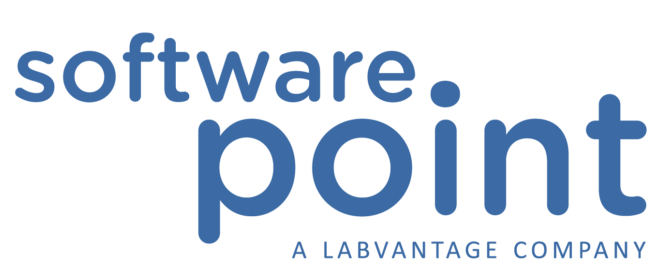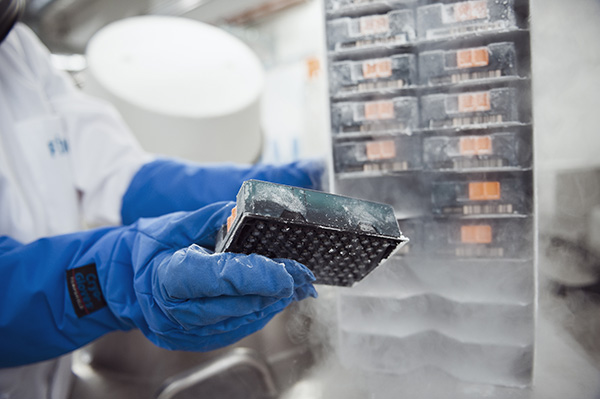
Helsinki Biobank
Industry
Biobanking
Helsinki Biobank

Donate health
Helsinki Biobank, owned by the Hospital District of Helsinki and Uusimaa (HUS), is the biggest hospital-based biobank in Finland. It collects patients´ samples in the largest Finnish hospital district and HUCH specific catchment area with over 1,9 million inhabitants.
Helsinki Biobank collects and stores biological samples and related data for future medical research and R&D purposes. Biobank research investigates causes for illness, and how genetic, environmental and lifestyle factors impact the etiology of diseases. It also studies disease prevention and the development of safe, more effective and personalized therapies and diagnostics.
Helsinki Biobank is founded and funded jointly by the Hospital District of Helsinki and Uusimaa (HUS), the University of Helsinki, Kymenlaakso Social and Health Services (Carea), and the South Karelia Social and Health Care District (Eksote).
Bee for the research
Founded in spring 2015, Helsinki Biobank processes tens of thousands new samples annually. For example, a piece of tissue or a test tube of blood is collected, in general, along with a hospital or laboratory visit, or together with other sampling, biopsy and surgery – with the patient´s written consent.
Collecting biobank samples and notices of consent is one of the key projects of HUS this year. The goal is to get samples from 10% of the altogether 500,000 patients this year, and from 25% next year.
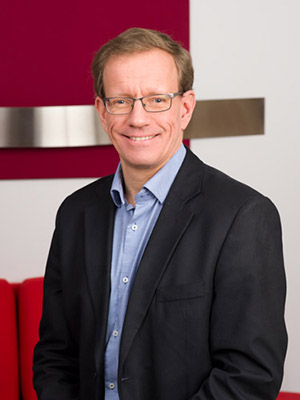 Director Kimmo Pitkänen sees that as a part of an academic hospital, Helsinki Biobank has a good basis to succeed in informing and engaging the management, doctors, nurses and administrative staff in all areas of responsibility in whole HUS, to join and support the research endeavour.
Director Kimmo Pitkänen sees that as a part of an academic hospital, Helsinki Biobank has a good basis to succeed in informing and engaging the management, doctors, nurses and administrative staff in all areas of responsibility in whole HUS, to join and support the research endeavour.”We have two great opportunities to beef up the operation: embed collecting of consents to the routines of clinical healthcare – in an encumbered working environment. Secondly, good IT tools relieve staff´s time resources, and help in implementing the practices as well as in an ambassador´s work. We are building our practices to make consent-giving as easy and automatic as possible. For instance, you can give your consent electronically on Helsinki Biobank´s website. In addition to the electronic services, we will send the Biobank fact sheet and other information materials to the patient on paper format, already along with the appointment letter to visit the hospital or outpatient clinic.”
If you visit the units of Hospital District of Helsinki and Uusimaa (HUS), the hospital personnel can ask your consent to collect your samples and personal data to Helsinki Biobank. The patient will receive the information leaflet about biobanking, information security and a consent form – on which the patient may allow or deny sampling for the biobank. So far 98% of those asked, have given their consent.
Treatment and diagnostics remains always the most important priority.
“At the same time, we must take care that the patients are given sufficient information so that they truly can take their stand on whether to participate in research by donating a biobank sample”, Pitkänen emphasizes.
The notice of consent, related data, location of the sample, for which studies the sample has been given for, and how much of the sample is still left in the sample collection, are integrated and administrated in LabVantage laboratory information management system (LIMS) now in use in Helsinki Biobank. All data is processed confidentially and protecting privacy – no identifying information about the donor will be forwarded to the researchers, authorities or the donor´s employer, for example.
The sample donor has the right to know where his samples or related data have been given. He may also decide if he wants to know about the relevant biobank research findings that may affect his own health.
A researcher or a research project in need of biobank samples contacts Helsinki Biobank first in a pre-enquiry stage, so that Helsinki Biobank is able to ponder its concrete possibilities to provide samples or related data.
”If the research project looks good and we believe we are able to serve, the applicant sends an official application. It will be considered in the scientific-ethical evaluation group which evaluates the project according to the Biobank Law, and either recommends or gives a negative statement for delivering biobank material. Principally, if the project is of high quality, and the diagnostics of the patient in question would not be endangered, the material is given”, Kimmo Pitkänen describes.
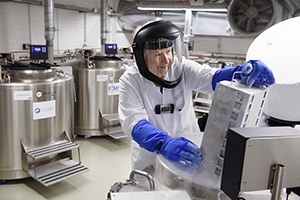 The research must possess scientific quality. After having the recommendation, the research material needed will be outlined, or, the evaluation group may suggest what could be added. A certain amount of test tubes is written in the contract, and the data is packaged and turned over for research purposes. According to the Biobank Law, the results of the research analysis are later returned into Biobank for future research projects.
The research must possess scientific quality. After having the recommendation, the research material needed will be outlined, or, the evaluation group may suggest what could be added. A certain amount of test tubes is written in the contract, and the data is packaged and turned over for research purposes. According to the Biobank Law, the results of the research analysis are later returned into Biobank for future research projects. ”This is one need for our information management system. There are lots of quality issues related to the returned data: for instance, how should we define the data related and added to the samples so that it is usable for the next studies.”
Quantitatively, pathology tissue samples are in a very important role: there are already 3-4 million pathology tissue samples in the collection, collected during 31 years into the HUS archive, which was transferred to Helsinki Biobank in summer 2016.
”It is a colossal amount of samples, and the majority of the 30 applications we have got so far, have asked for these samples.”
Together and on time
In early 2017, Helsinki Biobank chose LabVantage Biobanking laboratory information system, provided by Software Point, to administer the samples and data related to them. The first implementation of the system was taken in use in April, and the second phase will take place in the autumn. LabVantage Connect platform – which connects different systems and instruments, and supports the HL7-standard unifying clinical and administrative data – is also in use.
Helsinki Biobank employs 18 specialists: pathology and clinical expertise, laboratory and IT people, analysts. According to Kimmo Pitkänen, their first impressions of the new information management system are rather positive.
”Software Point has been able and willing to listen to our wishes. When the second phase of the system implementation is reached, I hope to get key ratio, statistics, and maybe visualization to follow-up our operations.”
Having lead Helsinki Biobank´s information management system renewal, Hanna Heikkinen, Head of IT accompanies:
“The project collaboration with the professionals of Software Point has been fluent, and thus we have been able to advance briskly and flexibly. The work has progressed in good spirit – sparring ideas together without unnecessary provider-client juxtaposition. Project communication has been straightforward and clear.”
Though it has been foreseeable, that to have an information management system with all the interfaces supporting a Finnish hospital-based biobank requires considerable work, Heikkinen notes that the workload was substantial. The project group proceeded continuously discussing and prioritizing, seeking first a solution as simple as possible, yet functional, which then could be elaborated in further development.
”We also anticipated the very rapid implementation timetable to be challenging – however, we succeeded to keep on schedule. Now the project continues with a bit more peaceful tempo till the end of this year, so we have many important functionalities and interfaces under development. All the time, we have made choices: in which pace we can take new features in use, and how much we focus on improving existing functionalities.”
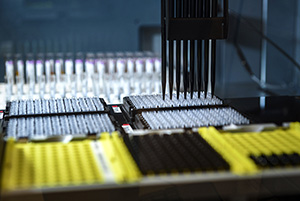 After having acquired the new system´s logic, the biobankers have been able to solve occasional hitches popping up in sample logistics or in integrating devices and systems, with the help of functionalities included in LabVantage system.
After having acquired the new system´s logic, the biobankers have been able to solve occasional hitches popping up in sample logistics or in integrating devices and systems, with the help of functionalities included in LabVantage system.Every day, data related to 150-200 new samples are entered in the system, and as each sample is divided into several subcohorts, the amount of samples grow fast. Moreover, there are millions of archive samples in Helsinki Biobank to be fed into the system soon.
”LabVantage system is already very useful in registering and administering the data related to the samples and donations. The biggest potential we reach when the system in integrated to the HUS data lake, and we can easily search for certain samples on grounds of, let´s say, a specific illness or an age group.”
”Similarly, we are waiting with bells on that we get down to linking the samples with the data administered in third parties´ systems – genome data and digitized imaging records. With the metadata related to them, we are able to classify and administer our sample collections even better.”
Biological big data
Tissue samples are given to researchers on a microscope glass, honed to very thin slices. The Biobank is refining sample material to research projects using also TMA method (tissue microarray), in which several representative samples from the same or different persons are collected on one microscope glass.
Director Kimmo Pitkänen is already envisaging future possibilities:
”One potential development path with both the traditional microscope glasses and TMA glasses, could be digitizing the glasses in Helsinki Biobank already before the transfer, and give only the visual recording to the researcher. This way the samples would not run out, and as they would be in electric format, couldn´t we also analyze them automatically?”
”This is such a long chain it would be wise to utilize not only the expertise of us and HUS, but also to look for corporate partners, talents, analysis algorithms, and services in between.”
”Furthermore, the forthcoming genome center is really remarkable matter to us because genome data is the first biological big data entirety which will be linked to biobanking. There is already a huge demand for that. There will soon be a large body of clinical data, and data related to a healthy citizen´s way of life, and biological data can be generated more and more. An ensemble in which we could examine whole the nation instead of single localities or diseases, would definitely be a world-class ensemble.”
Yet, Kimmo Pitkänen underlines that Helsinki Biobank is serving researchers, pharma companies and SME companies on the same level.
”The common denominator and ultimate reason for us is to be able to treat the patients better.”
More info: Helsinki Biobank
Text: Software Point
Pictures: Markus Sommers and Tero Hanski
1.9.2017
